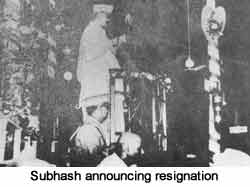

 |  |
 The Congress victory in the 1937 election and the consequent formation of popular ministries changed the balance of power within the country vis-a-vis the colonial authorities. The stage seemed to be set for another resurgence of the nationalist movement. Just at this time, the Congress had to undergo a crisis at the top an occurrence which plagued the Congress every few years.
The Congress victory in the 1937 election and the consequent formation of popular ministries changed the balance of power within the country vis-a-vis the colonial authorities. The stage seemed to be set for another resurgence of the nationalist movement. Just at this time, the Congress had to undergo a crisis at the top an occurrence which plagued the Congress every few years.Subhash Bose had been a unanimous choice as the President of the Congress in 1938. In 1939, he decided to stand again - this time as the spokesperson of militant politics and radical groups. Putting forward his candidature on 21 January 1939, Bose said that he represented the 'new ideas, ideologies, problems and programmes' that had emerged with 'the progressive sharpening of the anti-imperialist struggle in India.' The presidential elections, he said, should be fought among different candidates 'on the basis of definite problems and programmes.' On 24 January, Sardar Patel, Rajendra Prasad, J.B. Kripalani and four other members of the Congress Working Committee issued a counter statement, declaring that the talk of ideologies, programmes and policies was irrelevant in the elections of a Congress president since these were evolved by the various Congress bodies such as the AICC and the Working Committee, and that the position of the Congress President was like that of a constitutional head who represented and symbolized the unity and solidarity of the nation. With the blessings of Gandhiji, these and other leaders put up Pattabhi Sitaramayya as a candidate for the post. Subhas Bose was elected on 29th January by 1580 votes against 1377. Gandhiji declared that 'Pattabhi's defeat is my defeat'. The line of propaganda adopted by Bose against Sardar Patel and the majority of the top Congress leadership whom he branded as rightists. He openly accused them of working for a compromise with the Government on the question of federation. The Congress leaders, labeled as compromisers, resented such charges and branded them as a slander. After Subhash's election, they felt that they could not work with a President who had publicly cast aspersions on their nationalist bonafides. Jawaharlal Nehru did not resign along with the other twelve working committee members. He did not like the idea of confronting Bose publicly. But he did not agree with Bose either. next page >> |
Copyright ©2000 indiansaga.info. All rights reserved.
By using this service, you accept that you won't copy or use the data given in this website for any commercial purpose.
The material on indiansaga.info is for informational & educational purpose only.
This site is best viewed at 800 X 600 picture resolution.